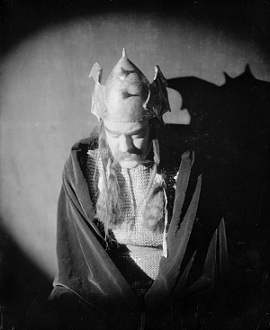| directory |
| home | contact |
|
|||||||||||||||
| search | |||||||||||||||
Macbeth's Soliloquy: To be thus is nothing (3.1.47-71)CommentaryMacbeth has killed Duncan and has become king of the Scots, yet he believes his crown is in jeopardy. The menace is Banquo. Like Macbeth, Banquo knows that there were two key parts to the unearthly revelation: first, that Macbeth will become king, and second, that Banquo will beget future kings. Macbeth fears Banquo is planning a coup to hasten the day of triumph for his heirs. Macbeth's mistrust of Banquo causes him to dwell on the Witches' prediction that he will have no successors of his own. Thinking that he has murdered Duncan to secure the throne for Banquo's offspring, Macbeth's unease grows to ferocious enmity as he vows to crush Fate's kingly plans for Banquo's children. A comparison between the above soliloquy and Macbeth's previous soliloquies in 1.7 and 2.1 reveals a key change in his character. Macbeth is again contemplating murder, but what impels his deliberation this time is not guilt and shame but panic and rage. The murder of Duncan has made the murder of Banquo a necessity and, more importantly to Macbeth's character development, a facile task. Gone is any trace of the humanity under the vaulting ambition -- gone are the moments of reflection and regret that prompted "this Duncan/Hath borne his faculties so meek" (1.7.17) and that incited the shameful plea "Thou sure and firm-set earth, Hear not my steps" (2.1.56). Macbeth forfeited his soul with the murder of Duncan. What is left now is the husk of a man who shows not a hint of compunction as he plans the murder of his noble friend. There is no remorse after the deed either. He was unable to say 'Amen' after Duncan's murder; now he effortlessly says "Thanks" to the hired assassins who slay Banquo, adding maliciously, "There the grown serpent lies" (3.4.38). What makes Macbeth a tragic character and saves him from becoming a one-dimensional monster is that he is perpetually conscious of his evil choices. He is poignantly aware of the rapid deterioration of his humanity, as we will see in his final and pivotal soliloquy in Act 5. For information on the metaphors in this soliloquy and in the play in general, please see my article, Biblical Imagery in Macbeth and Figures of Speech in Macbeth. For general commentary and line annotations for the whole scene, please click here. Back to Soliloquy Annotations. Questions for Review 1. How has Macbeth changed since his last soliloquy? 2. Macbeth fears Banquo is plotting against him when he says "'tis much he dares." Why is Macbeth so suspicious of Banquo? How has Banquo been behaving? See lines 17-20. 3. Has Macbeth misjudged Banquo? See lines 1-10. 4. How does this passage relate to 3.4.29-31, where Macbeth finds out Fleance is alive but seems unconcerned? 5. In Macbeth, the role and characterization of Banquo differs considerably from Shakespeare's primary source, Holinshed's Chronicles. Research Shakespeare's changes and discuss how they contribute to the play. More on this topic. How to cite this article: ______________ Even More |

More to Explore |
©1999-2021 Shakespeare Online. All Rights Reserved.